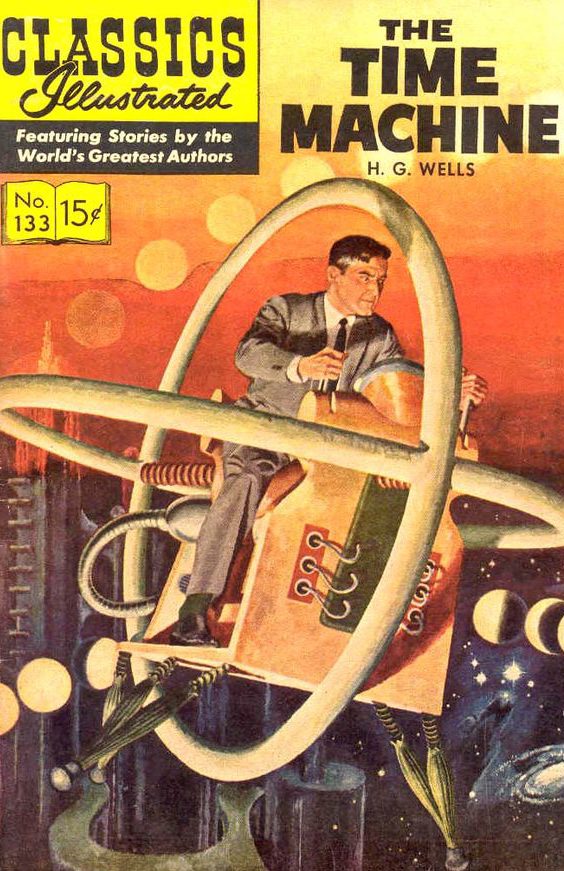Despite the constantly updated headlines, the world is likely getting much better by most measures, the major asterisk being climate change. Conditions have never seemed worse, though, with beheadings, xenophobia and terrorism in our faces and on our minds. A connected and wired world presents many shocks to the system, the Global Village both boon and bane. But we only seem to foresee dystopias now.
H.G. Wells, who wrote science fiction before it was so named, envisioned tomorrow’s downsides but held out hope. The author believed we should toss out the history books, which he felt poisoned us with nationalism, and start anew. His more optimistic side has been adopted by many Silicon Valley technologists, his pessimism by those crafting fiction. A strange dichotomy.
Excerpts from: 1) John Higgs’ Guardian article about the contemporary obsession with things falling apart, and 2) Jaron Lanier’s 2011 Edge article on Wells’ concerns about wealth inequality in the age of machines.
From Higgs:
For Wells, imagining a viable version of the future was an intellectual game. It was a chance to show off, and a seemingly respectable way to be deeply subversive. Writing to his friend Elizabeth Healy, he described Anticipations, his 1901 book of predictions, as “designed to undermine and destroy the monarch, monogamy, faith in God and respectability – and the British empire, all under the guise of a speculation about motor cars and electric heating”. Futurology, for Wells, was exhilarating. The idea that writers would give up even trying was so implausible that Wells never imagined it.
The sudden disappearance of worthwhile futures from our culture coincided with the rise in our understanding of climate change. Global warming indeed appears inevitable and apocalyptic, but is this reason enough to remove all hope from our visions of the future? Rising sea levels, the need to decarbonise the economy, and chaotic shifts in ecosystems are all difficult problems to engage with, but we are a species that lived through the Black Death, the Somme and the threat of global thermonuclear war. It seems odd that we would give up now.
I suspect the real problem is as much a rejection of originality as it is a reaction to climate change. In a hypermediated age where we are constantly engaged in filtering out the irrelevant, the last thing we want is to tackle the genuinely new.
But originality was Wells’s calling card.•
From Lanier:
This brings us back, literally thousands of years to an ancient discussion that continues to this day about exactly how people can make a living, or make their way when technology gets better. There is an Aristotle quote about how when the looms can operates themselves, all men will be free. That seems like a reasonable thing to say, a precocious thing for somebody to have said in ancient times. If we zoom forward to the 19th century, we had a tremendous amount of concern about this question of how people would make their way when the machines got good. In fact, much of our modern intellectual world started off as people’s rhetorical postures on this very question.
Marxism, the whole idea of the left, which still dominates the Bay Area where this interview is taking place, was exactly, precisely about this question. This is what Marx was thinking about, and in fact, you can read Marx and it sometimes weirdly reads likes a Silicon Valley rhetoric. It’s the strangest thing; all about “boundaries falling internationally,” and “labor and markets opening up,” and all these things. It’s the weirdest thing.
In fact, I had the strange experience years ago, listening to some rhetoric on the radio … it was KPFA, in fact, the lefty station … and I thought, ‘Oh, God, it’s one of these Silicon startups with their rhetoric about how they’re going to bring down market barriers,’ and it turned out to be an anniversary reading of Das Kapital. The language was similar enough that one could make the mistake.
The origin of science fiction was exactly in this same area of concern. H.G. Wells’ The Time Machine foresees a future in which there are the privileged few who benefit from the machines, and then there are the rest who don’t, and both of them become undignified, lesser creatures. Separate species.•
H.G. Wells meets Orson Welles in San Antonio (audio only):
Tags: H.G. Wells, John Higgs

